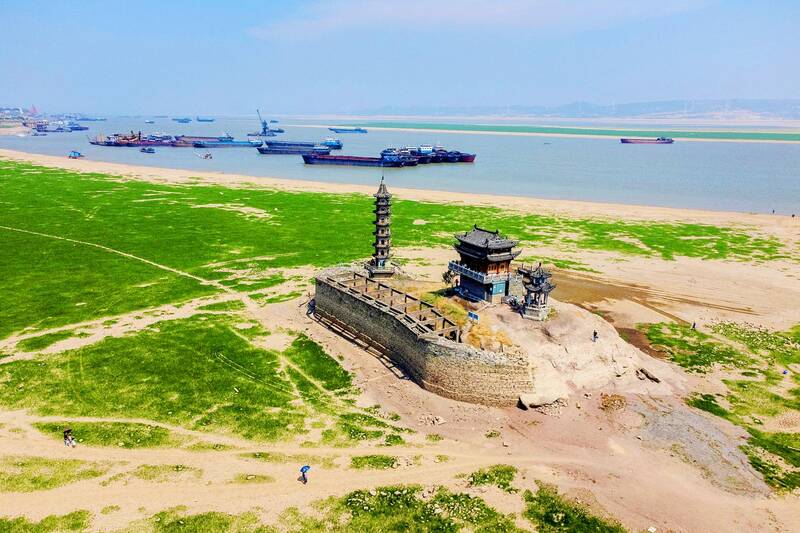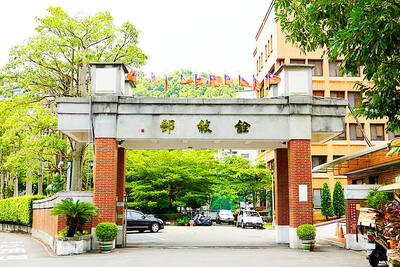A crippling drought exacerbated by a record heat wave has spread across half of China and reached the normally frigid Tibetan Plateau, according to official data released ahead of more searing temperatures yesterday.
The world’s second-largest economy has experienced more than 70 days of heat waves, flash floods and droughts — phenomena that scientists say are becoming more frequent and intense due to climate change.
Southern China has recorded its longest continuous period of high temperatures since records began more than 60 years ago, the Chinese Ministry of Agriculture said this week.

Photo: Reuters
Experts have said the intensity, scope and duration of the heat wave could make it one of the worst recorded in global history.
A chart from the National Climate Center on Wednesday showed that swathes of southern China — including the Tibetan Plateau — were experiencing “severe” to “extraordinary” drought conditions.
The worst-affected area — the Yangtze River basin, stretching from coastal Shanghai to Sichuan Province in China’s southwest — is home to more than 370 million people and contains several manufacturing hubs, including the megacity of Chongqing.
The China Meteorological Administration predicted continued high temperatures of up to 40oC in Chongqing and the provinces of Sichuan and Zhejiang yesterday.
However, some regions gained relief from the heat wave. Parts of southwestern Sichuan were battered by heavy rains overnight, causing the evacuation of almost 30,000 people, state broadcaster CCTV reported.
And in the southeast, Typhoon Ma-on made landfall in coastal Guangdong Province and Hong Kong yesterday morning.
“High temperatures have basically been alleviated in the regions of south China, Jiangxi and Anhui,” the meteorological agency said. “But high temperatures will continue for the next three days in regions including the Sichuan basin and provinces surrounding Shanghai.”
The Chinese State Council on Wednesday announced a 10 billion yuan (US$1.46 billion) subsidy to support rice farmers experiencing drought conditions, which authorities have warned pose a “severe threat” to this year’s autumn harvest.
China produces more than 95 percent of the rice, wheat and maize it consumes, but a reduced harvest could mean increased demand for imports in the world’s most-populous country — putting further pressure on global supplies already strained by the conflict in Ukraine.
Wednesday’s China Central Television evening news broadcast showed trucks supplying villagers who lacked drinking and agricultural water in rural Sichuan and Chongqing.

Taiwan Semiconductor Manufacturing Co (TSMC, 台積電) is expected to start construction of its 1.4-nanometer chip manufacturing facilities at the Central Taiwan Science Park (CTSP, 中部科學園區) as early as October, the Chinese-language Liberty Times (the Taipei Times’ sister newspaper) reported yesterday, citing the park administration. TSMC acquired land for the second phase of the park’s expansion in Taichung in June. Large cement, construction and facility engineering companies in central Taiwan have reportedly been receiving bids for TSMC-related projects, the report said. Supply-chain firms estimated that the business opportunities for engineering, equipment and materials supply, and back-end packaging and testing could reach as high as

CHAMPIONS: President Lai congratulated the players’ outstanding performance, cheering them for marking a new milestone in the nation’s baseball history Taiwan on Sunday won their first Little League Baseball World Series (LLBWS) title in 29 years, as Taipei’s Dong Yuan Elementary School defeated a team from Las Vegas 7-0 in the championship game in South Williamsport, Pennsylvania. It was Taiwan’s first championship in the annual tournament since 1996, ending a nearly three-decade drought. “It has been a very long time ... and we finally made it,” Taiwan manager Lai Min-nan (賴敏男) said after the game. Lai said he last managed a Dong Yuan team in at the South Williamsport in 2015, when they were eliminated after four games. “There is

Democratic nations should refrain from attending China’s upcoming large-scale military parade, which Beijing could use to sow discord among democracies, Mainland Affairs Council Deputy Minister Shen You-chung (沈有忠) said. China is scheduled to stage the parade on Wednesday next week to mark the 80th anniversary of Japan’s surrender in World War II. The event is expected to mobilize tens of thousands of participants and prominently showcase China’s military hardware. Speaking at a symposium in Taichung on Thursday, Shen said that Chinese Minister of Foreign Affairs Wang Yi (王毅) recently met with Indian Prime Minister Narendra Modi during a visit to New Delhi.

FINANCES: The KMT plan to halt pension cuts could bankrupt the pension fund years earlier, undermining intergenerational fairness, a Ministry of Civil Service report said The Chinese Nationalist Party (KMT) caucus’ proposal to amend the law to halt pension cuts for civil servants, teachers and military personnel could accelerate the depletion of the Public Service Pension Fund by four to five years, a Ministry of Civil Service report said. Legislative Speaker Han Kuo-yu (韓國瑜) on Aug. 14 said that the Act Governing Civil Servants’ Retirement, Discharge and Pensions (公務人員退休資遣撫卹法) should be amended, adding that changes could begin as soon as after Saturday’s recall and referendum. In a written report to the Legislative Yuan, the ministry said that the fund already faces a severe imbalance between revenue